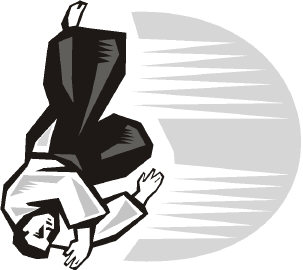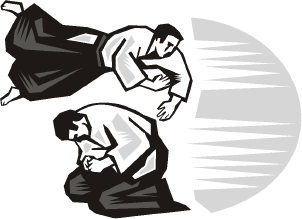Learn How to effectively
Protect Yourself With
Good Aikido Breakfalls!

Aikido Breakfalls suggest what they are named for, breaking the force of your fall to the ground without injury. On the other hand, ukemi is the ability to receive a technique or fall safely and recover your balance.
Learning to develop good ukemi is difficult. Many Aikidoka focus on this skill in a limited way, as their main focus is on becoming a good performer of technique.
One of the reasons for this is people in the West are generally very competitive. We have been taught to put ourselves first... winning is better than losing.
This means that we tend to concentrate more on performing Aikido techniques, and winning, rather than receiving Aikido breakfalls and losing (gracefully).
This way of thinking is rather egotistical and selfish, and Aikido training addresses this problem directly. In order to take we must give, and vice versa. So by focusing more on helping our training partner, we will help ourselves.
In my many travels of Aikido dojo, I have found hundreds of students that have a reasonable level of technique. But, most dojo only have a few good uke, that can be used for demonstrations.
This is because the goal of most students is to win and perform well.
YOU can excel at the art by looking more closely at Aikido breakfalls and good quality ukemi practise. By working on falls, you can develop greater confidence. This allows you to benefit your training partner, by not resisting their techniques.
This helps them develop their skills and yours must faster, its a win-win situation, that removes the conflict from the connection.
Resisting more and pressure testing techniques should be done at a much later stage in training. I would suggest brown and black belt level.
Aikido Success Blueprint offers you Key Action Steps for fast results!
Aikido Breakfalls
in More Detail

Some of the breakfalls you'll learn
during your training include rear backward,
Side, forward rolls, jumping forward breakfalls...
Back Aikido Breakfalls Description
They are first learned by lying on your back on the tatami mat. First bend your knees, so your heels are flat on the floor, with arms held palm-down at 45 degrees from your body. Lift your head, with your chin touching your chest. This strengthens your neck muscles, and protects your head from hitting the ground.
Then,
lift your arms up and slap the ground with your palms and
forearms all sharing the impact. Repeat several times, and breathe out
each time you hit. When you can do these slaps comfortably from
lying down, you can move on...
From a sitting position, just roll back, making sure your
chin is tucked well in and exhale strongly. Slap the ground, and repeat
several times.
Then try from a squatting
position with your buttocks sitting on your heels. Tuck in your chin and
curve your spine, and allow your body to roll backwards so your back
hits the floor. You should force your breath out sharply, and slap the
mat just as you touch it, repeat several times.
Practice
this until you can do it without jarring your body, with no feeling of
shock. Eventually you can try it from a standing
position. Stand up straight, bend your knees and lower your buttocks
close to the ground, and place one foot slightly behind the other. Roll
onto your back, and continue as before.
Side Aikido Breakfalls Description
You
should already be able to perform back breakfalls before you try to
learn side breakfalls, which are just one-armed, one-sided back
breakfalls.
You would fall on your side if the person throwing you is still hanging on to one of your arms, that he used to break your balance and make you fall down. If you are doing it on a nice dojo mat, you'll slap the ground with your hand.
If in the street or on
concrete, you might keep your free arm on your stomach as you fall, to
prevent it getting damaged, and leaves the arm ready to protect your
face from a blow.
Remember, if you slap, your arm should be
at about 45 degrees from your body when it hits the mat. Immediately
after, you should withdraw your arm to protect your chest or face to
block a punch or kick.
Practice by lying flat on your back,
lift your head and shoulders off the mat and curve your back as you rock
back on your curved spine, and raise your legs high into the air. Then
drop your legs to your right side, and slap the ground with your right
arm palm down at 45 degrees.
Your right hip, knee and the
whole side of your right leg and calf should be flat on the mat. Your
left leg should be bent at the knee, with your left foot flat on the
ground.
Correct your side Aikido breakfalls posture, making sure
your chin is fixed to your chest. Then sit/rock backwards and raise
your legs into the air again, straight up. Then come down on your left
side.
Again, check your ukemi ... left hip, knee and the
whole side of your left leg and calf should be flat on the mat. Your
right leg should be bent at the knee, with your right foot flat on the
ground. Do side breakfalls to your right, left, etc. until you have done
them several times on each side.
Forward Aikido Breakfalls
Description
Rolling
Breakfalls are sometimes called Forward Rolls in other martial arts.
Ukemi is the Japanese word for the art of falling safely, and gymnasts
call it tumbling. It's all about not getting hurt when you fall down.
Forward
Rolls are very important because they get you back up onto your feet
immediately, so you can continue defending yourself. Before you try
Rolling Breakfalls, you should already know Back and Side
Breakfalls.
Rolling breakfalls are impressive to watch,
especially during a demonstration. But they take considerable practice.
When your body falls at speed, you need to protect your head and neck,
spread the shock and save your arms and legs.
You accomplish
this by making your body into a circle, where your body rolls. The
energy is absorbed along the perimeter of the circle, and nothing gets
damaged. Practise on tatami mats.
Think
of your shoulders, arms and hands as a hoop or a circle. Roll along
your extended hand and arm, shoulder, the center of your back, your
spine, buttocks, legs and feet. You must train your body so it touches
the ground all along this pathway each time you do a rolling fall.
High Rolling Aikido Breakfalls
Description
Kote-gaeshi
Aikido breakfalls are how you escape from a very nasty arm break in
Aikido or Ju Jitsu. If you don't know how to leap over your own arm
quickly, and land with a good side breakfall, your arm may snap when
someone hits you with a Kotegaeshi throw at full power.
The
Kote-gaeshi breakfall is not for Aikido beginners, and you need to build
up your Ukemi skills before you try this. You would start learning
Kote-gaeshi breakfalls by practising with a partner in the dojo.
The
first few times, the assisting partner holds your hand lightly, turns
and kneels as he places your hand palm-down on the mat. This makes
it safer for you to do a gentle rolling breakfall over your captured
arm.
Once you get you used to timing your breakfall to the
actions of someone else, you can then practice increasing the power of
the move until you are actually being thrown into the breakfall.
The
variety of falling from ukemi in most Aikido breakfalls allows for the
angular throws to allow for rolling rather than dumping you partner.
Unlike
the gentler angles of Aikido, the uncontrolled falling that sometimes is
found in many harder styles can cause injury over time, even if the
fall is interrupted or broken by correct breakfalls the force can
overcome the level of safety.
In meeting the mat try to distribute as much force throughout your body as possible in the most relaxed manner. It takes a lot of practice to achieve the correct timing, and allow your body to distribute the force.
Aikido Success Blueprint offers you Key Action Steps for fast results!
Want local training in Bognor Regis UK? Visit... Arun Aikido Club
Has this page been useful to YOU? It may benefit other people too! Please go ahead and pass it on - Share via the Link Bar below - many thanks!
Sick of the Elite Control System? Unplug from the Matrix Now!







